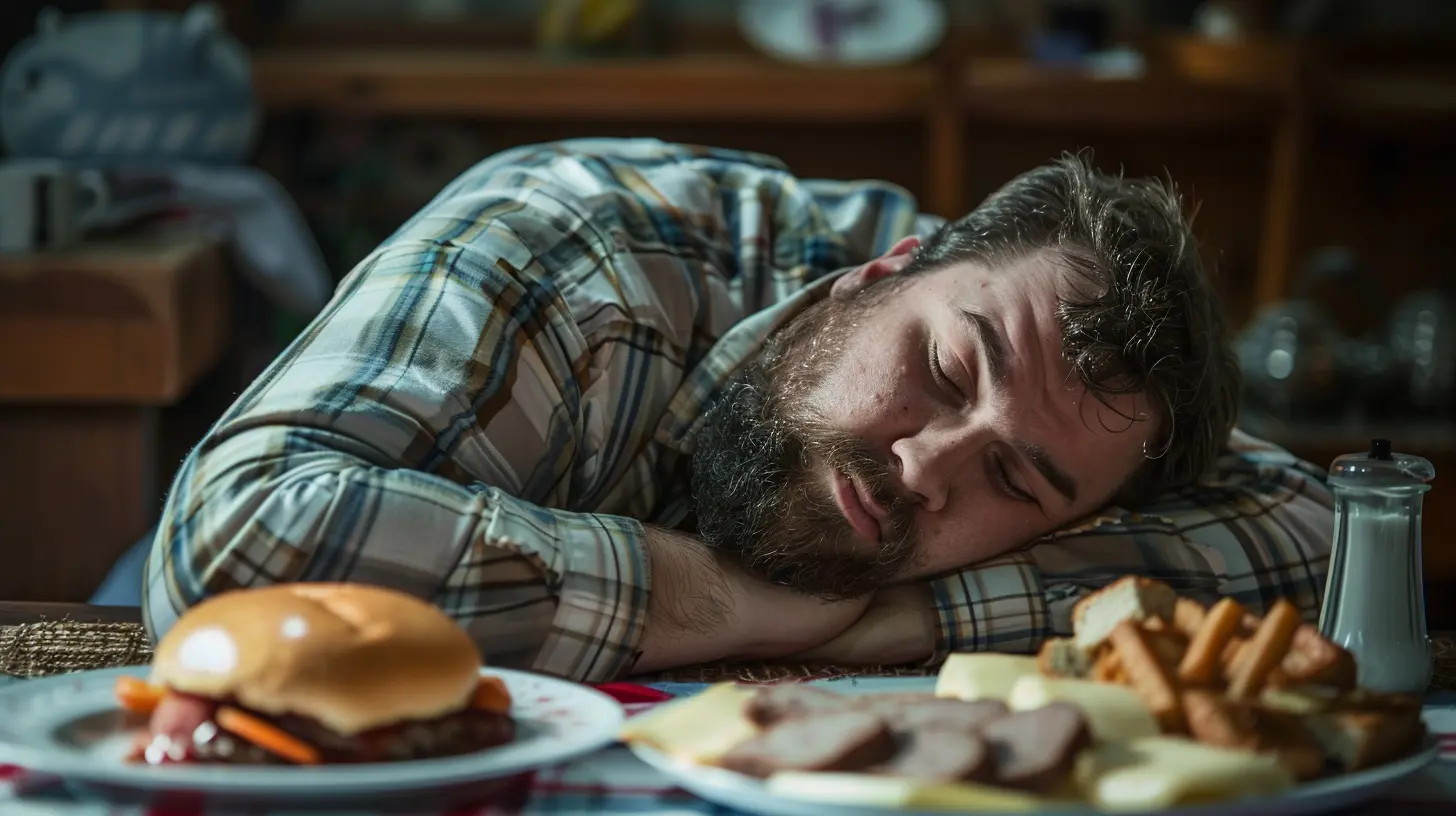The Impact of Poor Sleep on Weight Gain and Metabolism
23 October 2025
Let’s talk about something that affects almost every single one of us — sleep (or the lack of it). You’ve probably heard that good sleep is essential for your health, right? Well, it turns out that lousy sleep doesn’t just leave you feeling groggy and grumpy. Poor sleep is a total chaos-starter when it comes to weight gain and metabolism.
Yep, if you've been hitting the gym, eating clean, but still struggling to lose weight or keep it off — your sleep habits might be the missing piece of the puzzle. So grab a cup of green tea (or coffee, if it’s still early) and let’s break this down.
Why Sleep Is More Than Just Rest
Most people brush off sleep like it's a luxury. Newsflash: it’s not. Sleep is when your body does its maintenance work — repairing tissues, balancing hormones, and resetting your brain so you’re not a walking zombie the next day.Think of sleep like hitting the “save” button on your computer. Without it, nothing sticks. And when you don’t get enough, your body basically goes into panic mode… and that’s where the weight gain madness begins.
The Science: How Sleep and Weight Are Connected
You don’t need a PhD to get this — it’s actually pretty straightforward. When your sleep is out of whack, two major appetite-related hormones — ghrelin and leptin — go haywire.- Ghrelin is the "go" hormone. It tells your brain, “Hey, I’m hungry!”
- Leptin is the "stop" hormone. It signals, “Alright, I’m full now.”
When you’re sleep-deprived:
- Ghrelin goes up
- Leptin goes down
In other words, you eat more and feel less satisfied. Recipe for disaster? You bet.
Late Nights = Late-Night Snacking
Let’s be real here. When you're up at 1 AM binge-watching a Netflix series, you're way more likely to reach for chips, cookies, or something deep-fried than a bowl of kale. Anyone who says otherwise is lying or has superhuman willpower.Poor sleep messes with your brain’s reward center. It makes junk food look 10x more tempting. That’s not just anecdotal — studies have shown that sleep-deprived people crave high-sugar, high-fat foods. So if you’re wondering why that donut feels irresistible after a bad night’s sleep, now you know.
Slow Metabolism? Blame Your Sleep
Metabolism isn’t just about how fast you burn calories. It’s a complex system that controls how your body processes food and turns it into energy. Think of it like a car engine. If something’s off, the whole system underperforms.When you're not sleeping well:
- Insulin sensitivity drops. Your body gets worse at processing sugar.
- Your body stores more fat.
- You burn fewer calories at rest.
Long story short: your body becomes super efficient at holding onto fat, especially belly fat. Thanks, sleepless nights.
Cortisol: The Sneaky Fat Storage Friend
Ever heard of cortisol? It’s the stress hormone that spikes when your body is under pressure — and guess what? Poor sleep is a major stressor.High cortisol levels:
- Increase appetite (especially for sugary stuff)
- Promote fat storage, particularly around the belly
- Mess with your energy levels and mood
So if your sleep sucks, your stress levels rise — and then your body starts hoarding calories like it’s prepping for winter.
Muscle Mass and Sleep: An Underrated Duo
Muscles aren’t just for flexing in the mirror; they’re metabolically active tissue. This means they actually help you burn more calories, even when you're doing nothing. But here’s the kicker — your body builds and repairs muscle during deep sleep.No sleep, no muscle repair. No muscle growth. That translates to:
- Lower overall calorie burn
- Slower metabolism
- Easier fat gain
If you’re investing time in strength training but not sleeping enough, you’re stuck on a metabolic hamster wheel with no escape.
Sleep Deprivation Cranks Up Cravings
You ever notice how everything tastes better when you’re tired? That’s not in your head. Lack of sleep doesn’t just increase hunger — it messes with your ability to make smart food choices.Your prefrontal cortex (the part of your brain responsible for decision-making) slows down when you’re sleep-deprived. That means:
- You’re more impulsive
- You’re more likely to overeat
- You’re more attracted to high-calorie foods
Basically, your brain turns into that one friend who always says, “You deserve it!” every time you walk past a bakery.
You Move Less When You Sleep Less
Let’s face it — after a night of terrible sleep, working out sounds about as appealing as licking sandpaper. Your energy tanks, motivation crashes, and suddenly the idea of skipping the gym sounds like self-care.But here’s the problem:
- Sleep-deprived people are less active
- Less activity = fewer calories burned
- Fewer calories burned = fat gain
Even your non-exercise activity (like walking around or doing chores) slows down. And over time, that adds up big time.
Sleep Debt Is Real — And It’s Costly
Think you can just catch up on sleep on the weekend? Think again. Sleep debt is cumulative. That means if you’re consistently missing out on sleep during the week, sleeping in on Saturday isn’t going to magically fix your metabolism.Your body keeps score. And the longer you ignore the scoreboard, the harder it gets to undo the damage.
Can You Reverse the Damage?
Here’s the good news: absolutely. Your body is insanely resilient. Start prioritizing better sleep today, and you’ll start to see (and feel) changes much faster than you expect.Here’s how:
- Stick to a sleep schedule — yes, even on weekends
- Keep your bedroom cool and dark — think cave vibes
- Ditch screens at least an hour before bed
- Watch your caffeine — it’s not your best friend after 2 PM
- Avoid heavy meals late at night
Even just adding an extra hour of sleep can start shifting your hormones, revving your metabolism, and cutting those crazy cravings.
How Much Sleep Do You Really Need?
Most adults need at least 7 to 9 hours of good-quality sleep each night. Not just lying in bed staring at the ceiling — we’re talking real, restorative sleep.If you’re consistently getting less than 6 hours, your body is probably in full metabolic meltdown, whether you see it or not.
Bottom Line: Sleep Smarter, Not Just Harder
Let’s get one thing straight — productivity isn't defined by how little you sleep. Hustling your health into the ground doesn’t make you a boss. It makes you exhausted, hormonal, and a lot more likely to store fat.Want to lose weight? Boost energy? Balance hormones? Step one: SLEEP.
Fix your sleep, and your metabolism will thank you. Your cravings will chill out. Your energy will bounce back. And yes — those stubborn pounds will finally start to budge.
You’re not lazy. You’re just tired. Prioritize your rest like your health depends on it — because it absolutely does.
TL;DR (Because We Get It)
- Poor sleep messes with hunger hormones like ghrelin and leptin- It increases cravings for junk food and impairs judgment
- It slows your metabolism and increases fat storage
- It kills your energy — making you move less and burn less
- Chronic sleep debt adds up fast and hurts long-term weight loss
So if you’re doing “all the right things” and still not seeing results — maybe it’s time to stop blaming your willpower and start blaming your pillow.
all images in this post were generated using AI tools
Category:
Sleep HealthAuthor:

Tiffany Foster
Discussion
rate this article
1 comments
Harley Dillon
Great insights! Sleep truly is vital for weight management!
October 29, 2025 at 5:32 PM

Tiffany Foster
Thank you! I completely agree—quality sleep plays a crucial role in maintaining a healthy weight and metabolism.


